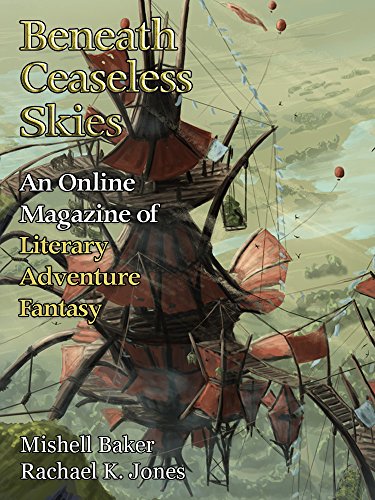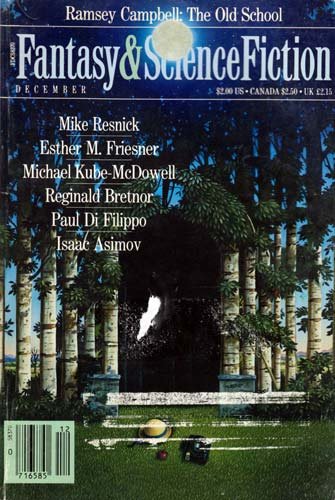![]() “The Night Bazaar for Women Becoming Reptiles” by Rachael K. Jones (July 2016, free at Beneath Ceaseless Skies, 99c Kindle magazine issue)
“The Night Bazaar for Women Becoming Reptiles” by Rachael K. Jones (July 2016, free at Beneath Ceaseless Skies, 99c Kindle magazine issue)
About half of the stories I review, I have listened to while I’m at the gym, sweating away on the elliptical or lifting weights to the sweet sound of a narrator telling me about the ghosts in Savannah or how to steal the heart of a dead witch. That’s what I was doing when I started listening to this story, but halfway through I had to stop, to sit out the rest of my workout, so nothing would distract me from Jones’ words.
She tells the story of Hester, an egg seller at the Night Bazaar in Oasis, a city stranded in a desert, “a prison with bars of thirst and heat.” Hester’s occupation, selling the eggs of reptiles to women who want to shed their skin and slide away over the sand in new, serpentine bodies, is outlawed in Oasis. The eggs don’t work for Hester, though; she feels trapped in her life with Marick, her day-time lover, a man who watches her closely but never touches her. Even Shayna, her night-time lover, seems more free and content than Hester.
The world building of this story was so precise, mythic and specific at the same time. Tiny details, such as the shape of Hester’s earring, come to have more significance later in the story. The language was heartbreakingly poetic, almost dreamlike at times. And the story took twists and turns that I didn’t expect but had a kind of fairy-tale logic to them. In short, this story was tailor-made for me to love it. I would read a whole novel in this world, in Jones’ prose. ~Kate Lechler
![]() For I Have Touched the Sky by Mike Resnick (1989, free at Baen [sample story from the Kirinyaga anthology], originally published in Fantasy and Science Fiction). Nominated for 1990 Hugo and 1989 Nebula awards (novelette)
For I Have Touched the Sky by Mike Resnick (1989, free at Baen [sample story from the Kirinyaga anthology], originally published in Fantasy and Science Fiction). Nominated for 1990 Hugo and 1989 Nebula awards (novelette)
For I Have Touched the Sky is one of Mike Resnick’s tales about Kirinyaga, a terraformed planet where the descendants of a Kenyan tribe have adopted the Kikuyu’s ancient lifestyle, including treating women as their tribe historically would have, as little more than servants. One day Koriba, the mundumugu or witch doctor, is accosted by Kamari, a very bright prepubescent girl, who asks him to heal the broken wing of a falcon that Kamari has found, even though Koriba warns her that it won’t work:
“Once a bird has touched the sky,” I explained, “he can never be content to spend his days on the ground.”
“I will make him content,” she said with determination. “You will heal him and I will care for him, and he will live.”
Kamari and Koriba agree that in return for his help healing the falcon’s wing, she will clean his hut for a month. But Kamari, too, is not content. When she realizes that Koriba, unlike the rest of their tribe, has a computer and can read, she begs him to teach her. Koriba refuses: no woman is permitted to read; it is their duty to till the fields, make meals, keep the home and bear children. Kamari, however, is bright enough to teach herself to read from the computer and books Koriba has in his hut, and Koriba is faced with a painful choice and its consequences.
For I Have Touched the Sky explores many of the same issues as The Manamouki, reviewed in our July 11, 2016 SHORTS column, but is a different variation on the theme of the clash between traditional and modern values and lifestyles, and how that affects women in particular. This story is more heartbreaking, with an intelligent and determined young girl who doesn’t understand why she can’t be allowed to learn and grow just a little more. As in his other Kirinyaga tales, Resnick deftly weaves in traditional-type fables that relate to the plot and themes of the story. ~Tadiana Jones
![]() “An Ocean the Color of Bruises” by Isabel Yap (July 2016, free at Uncanny, $3.99 Kindle magazine issue)
“An Ocean the Color of Bruises” by Isabel Yap (July 2016, free at Uncanny, $3.99 Kindle magazine issue)
Five old college friends, Heinz, Nina, Rich, Josie and Chino, reunite for a three-day vacation on Punta Silenyo, a small island in Phillipines where, many years ago, a tropical storm killed a large group of high school and college students there for Beach Week.
The tragedy wasn’t real to us. Typical Philippines: large swathes of people cleared out in one go, like a giant hand had slapped them off the earth. Everyone thought Punta Silenyo wouldn’t recover, but even if it never regained its former glamour, people came just the same. Even the ghost–hunting tours stopped after awhile. Death is only one other song often played on these islands.
Even though the island is, curiously, almost deserted, the group of five friends enjoys reconnecting. Heinz and Chino are dating, but the rest haven’t seen each other much lately. They go parasailing, get drunk, and just hang out and enjoy each other’s company … until horror crawls in through the hotel window.
“An Ocean the Color of Bruises” is an oddly introspective horror story. The narrator seems to be the entire group of friends, speaking always as an elusive “we” that is not the viewpoint of any particular person. The terror that they face on Punta Silenyo is just a different type of horror than the despair of their day-to-day lives, where the friends all feel lost and adrift. ~Tadiana Jones
![]() “Magnifica Angelica Superable” by Rochita Loenen-Ruiz (July 2016, free at Lightspeed, $3.99 Kindle magazine issue)
“Magnifica Angelica Superable” by Rochita Loenen-Ruiz (July 2016, free at Lightspeed, $3.99 Kindle magazine issue)
A woman walks into a café, red-faced from the cold, her laughter and her rage. She yells at the men sitting at a table, eating and drinking away the evening. She then throws the furniture and the men out of the café and has a long chat with the waiter, telling him that things are going to change, that men are going to have to get over their mistaken ideas, and that she, Magnifica Angelica, is going to use her godly powers to ensure that it happens.
“Magnifica Angelica Superable” is an unabashedly enthusiastic and even optimistic women’s liberation type of tale, with Angelica, the divine female, inspiring the women of the town to wake up, stretch themselves and embrace the capabilities and powers within themselves … and forcing the men out of their chauvinistic mindset, making them realize that it might not be so bad to be with women who are passionately pursuing their dreams and personal growth.
It’s a rather simplistic, moralistic tale, albeit one with a message that still needs to be heard by many men and women. Lightspeed Magazine’s interview with Rochita Loenen-Ruiz (who like Isabel Yap is a Filipina author), discussing this story, is well worth reading. ~Tadiana Jones
![]() “Totem Poles” by Rudy Rucker and Bruce Sterling (August 2016, free on Tor.com, 99c Kindle version)
“Totem Poles” by Rudy Rucker and Bruce Sterling (August 2016, free on Tor.com, 99c Kindle version)
In this satirical story, aliens have arrived on Earth and promptly began cleaning up all of the pollution caused by humans.
The air invaders resembled classic flying saucers. They haunted Earth’s skylines, absorbing pollutants. In their seagoing form, the saucers took on shapes like whales. They devoured poison gyres of floating plastic with their ivory teeth, and filtered toxins with their dark baleen. And the subterranean saucers were colossal, rubbery, saucer worms. They infested mankind’s mines and landfills, erasing every scrap of poison they found.
As a result, the rain forests are recovering, the polar ice is freezing again, and most of humanity welcomes the aliens. There are some people, however, who distrust the aliens’ motives (“If you wash an apple before eating it, do you do that for the apple’s good?”) ― so much so, that they do their best to kill the aliens, even though the aliens have evinced a complete unwillingness to harm people.
It’s an engaging idea, but Rucker and Sterling focus on quirky satire and surrealism at the expense of clarity and accessibility. “Totem Poles” is a very weird and disjointed tale, in which strange bedfellows like spirits of the dead, edible alien grubs, cities somehow reproduced by aliens, and resurrected “saucer saints” all play a role. ~Tadiana Jones









I’ve heard really good things about “An Ocean the Color of Bruises,” but haven’t had a chance to read it yet; likewise, “The Night Bazaar for Women Becoming Reptiles.” I”ll see if I can make some time for short fiction this weekend!